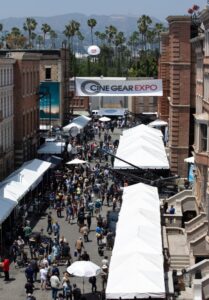Last month NAB New York became the latest industry trade show to go virtual, basically moving panels and product demoes online into a glorified pre-taped Zoom meeting. This follows a year in which many of the bigger shows, including IBC Showcase, were cancelled or postponed, opting in favor of a similar digital experience. Very early on, the NAB Show that normally takes place in Las Vegas in April decided to do something called NAB Show Express, instead taking place in mid-May. CineGear Expo cancelled both its L.A. Expo that was supposed to take place over the summer and its October ATL Expo in Atlanta, which was also put on hold in favor of a 2021 show. The decision to avert unexpected costs and avoid health and safety risks to and from exhibitors and visitors led to the 2020 European trade fair Photokina being delayed all the way back to May 2022.

A few months ago, Below the Line took on the task of trying to determine what the future for these trade shows might be and whether industry trade shows like NAB, CineGear, and others have any chance of surviving without many of the reasons why vendors, manufacturers, consumers, industry tech people and others attend these shows each year.
There are many obvious problems associated with holding any sort of in-person trade fair during the pandemic, the primary one being all of the travel restrictions between countries and even between some states. Even so, trade shows are something that are almost necessary to be conducted in-person not only for the networking aspect but also for some of the demonstrations that allow entertainment professionals to test out new technology before purchasing.
It costs a lot of money to put on these shows, but postponing or cancelling them outright means a loss in revenue not only for many of the exhibitors but also for the organizers, and one wonders whether not having some of these shows could put a huge financial burden on those relying on international attendees to show up with their checkbooks ready to invest.
Having thousands of professionals converging in one place is not something that will happen again any time soon, but one has to wonder which trade show will be the one that goes ahead as planned and whether some of the companies who rely on them to market wares can figure out other ways to connect with potential customers.
To explore this matter further, Below the Line spoke to four individuals who come to these trade shows from various departments and angles. As much as things have changed since we spoke to some of them, things really haven’t changed very much. There’s still a lot of uncertainty on whether there will be a vaccine anytime soon, when we’ll be able to congregate in large groups and most importantly, travel is still a major issue. The COVID pandemic that hobbled the industry back in March has had its ups and downs throughout the past few months. As expected, cases have gotten worse in many countries, including the United States and Canada, while fall weather continues to push more people indoors.

The first person we spoke to for this article was Julianne Grosso, Co-Founder of CineGear Expo, who told us more about the way the show had to pivot in 2020 after hosting the Los Angeles-based show since 1996, for the last 11 to 12 years at the Paramount Pictures lot.
CineGear was one of the earliest to cancel, as Grosso told us. “On March 19, we talked about what were going to be our next steps. In the end, we collaborated with our exhibitors, and we decided to push to October, but then we canceled that in May.”
“They were supportive and understood,” Grosso said about exhibitors’ reactions. “Disappointed, of course. At first, maybe some thought it was early, but everyone understood being safe, and same with the attendees as well.
Since then, CineGear has begun a series of webinars under the label “CineGear: On Air” – the next one being one to celebrate 100 years of American Cinematographer magazine.

Below the Line also spoke with a number of vendors, including Matthews Studio Equipment Sales Manager Linda Swope, and Martin Vann, Senior Vice President of Sales from Creative Solutions. Both companies are based in California, but Creative Solutions — comprised of three specific production-concentrated brands: Teradek, SmallHD and Wooden Camera – has more of an international presence with over 200 employees. Each company plays an important role in the production process with Matthews celebrating its 50th year manufacturing dollies, stands, and other equipment for grips and gaffers, while Wooden Camera designs and manufacturers professional camera accessories.
“Trade shows, in the blink of any eye, went from being a huge part of our industry to [being] non-existent, so what a change!” Vann explained to us. “Until the Coronavirus hit, we historically had a big presence at most trade shows. They were a great way to directly communicate with our customers, business partners, and our own colleagues from various offices worldwide— all under one roof.”
“It is no surprise that the pandemic led to the closure of all our live tradeshows in 2020,” Vann added. “There were just too many risks, and for many months, we didn’t want our employees to travel. We take our responsibility to protect the health and safety of our employees and customers very seriously. We have strict protocols on mask-wearing in the office, and most of our employees have been encouraged to work at home.”
“NAB in April was when we first started getting wind of COVID,” Swope said. “It was decided by management that we were not going to go. We were going to go up there and place something in the booth, but we were not going to attend. Shortly after that, they canceled, and same with IBC. We had booked flights and we had booked rooms, but then they cancelled.” Some of these rooms are booked a year in advance for NAB and other shows.

Last and certainly not least in this conversation is Cinematographer James Mathers, founder of the Digital Cinema Society, which he has been running for 18 years after making the 2002 documentary short, Digital Cinema Solutions. As a working DP, Mathers has decades of hands-on experience on the equipment displayed at some of the aforementioned trade shows. DCS is “dedicated to the industry’s informed integration of new technology,” created to help separate the facts from the hype and give DPs and camera crew honest opinions on changing technology. DCS is non-profit, depending on corporate sponsorship in addition to member dues. Its appreciation to supporters is reciprocated by covering products at major trade shows, going from booth to booth conducting short interviews on cinema-related products and technology.
“We were averaging 65 interviews every year,” Mathers said about DCS’s trade show presence. “We have an editor across the street at a hotel, we have a small crew — just myself and cameraman. Sometimes, we added a third person just to be like a coordinator, and then we would have the videos edited and streaming within an hour or two, because everybody wants to see what’s new at NAB.”
Film and television production are such gear-related industries, where it’s important to stay on top of the technology curve to remain relevant. It’s one of the reasons why trade shows have been such draws for the likes of CineGear, which has taken place on the Paramount Pictures lot in Hollywood for nearly ten years. An atmosphere of camaraderie is created by trade show gatherings that might not be easily replicated digitally, plus there’s the matter of actually wanting to get your hands or eyes on something in person.
Vann also acknowledged the importance of end users having a chance to test drive technology before making future purchases. “Our industry, typically, has embraced trade shows, because some products, especially new product introductions, are better experienced in person,” he confirmed. “We recently announced delivery of a new series of 4K monitors from SmallHD. Our customers told us that seeing the monitors is a must. Obviously, a trade show would have certainly helped them, beyond pressing the flesh. On the other hand, cloud-based products don’t really need a trade show to be demonstrated—you can do it with Zoom.”
“There are certain products which we can do virtual or live demos of,” Swope explained about taking the online route to show Matthews’ products. “We have big product, but we’ve also got small product. We’ve got camera support things, camera movement things, a lot of the big light stands. We can definitely pick a selection of equipment, based on the time allowed, and put a program together where we can demo items.
“There’s getting to be a lot of webinar fatigue,” Mathers confessed. “People are really getting pretty tired of this whole way of receiving the information.” Since speaking to Mathers for this article, he wrote a few further thoughts on the subject of trade shows over at Digital Cinema Society, a group anyone working in the realms of camera and cinematography should check out, as well as that critical element of film and television production.
Mathers brings up an interesting subject, since many of us have already reached an overload fatigue with all the virtual webinar opportunities being offered every week. Another major reason trade shows have been so popular over the years is because it gives vendors and potential customers the chance to “press the flesh,” to catch up with old acquaintances and maintain relationships which are often held together by a sporadic Email or phone call.

“We’re certainly [at NAB] to see new customers, to show a new product, but it’s also to maintain those relationships, to see someone we haven’t seen in a year,” Swope said, admitting that she prefers getting on the phone with customers vs. sending Emails. “it’s all about cultivating those relationships. A lot of our customers are our friends. We have really fabulous customers, so it’s great to see those friends once a year or twice a year if we do CineGear and NAB. IBC in Amsterdam is my opportunity to see all of my customers in Europe.”
“Volume is one of the big differences,” Vann confirmed. “At NAB, IBC and CineGear we saw thousands of customers over the length of a show, and we would meet potential new clients. Connecting online can become an easier environment to have more meaningful dialogue without interruption. We’ve found that during the pandemic, things have slowed down a bit, giving us the opportunity to help customers better understand how to engage safe set processes and how to embrace streaming. The real-world issues have revealed business opportunities that may not have happened in the pre-Covid trade show world.”
“I don’t think that they’re over,” Mathers said about trade shows about his trepidation about the way they’ve pivoted online. “I think maybe manufacturers have seen that they can save quite a bit of money. It’s a million-dollar operation when they have to set-up a booth at NAB and then send 40 people across the country or across the world and put them up. That’s a giant investment they all save this year, actually. They might tone it down, but I think that there’s still value in having the face time and and being there. I think maybe the shows will start to get more focused.”
“It’s way beyond masks and social distancing,” Vann explained about returning to what once was. “Companies like ours would have hundreds of employees traveling to shows from around the world, and that represents a tough scenario right now. How can we send employees to shows when we can’t guarantee their health and safety? We are not rushing to trade shows until they are safe and customers tell us they plan to attend.”
“It’s hard to say what people want to do,” Grosso concluded. “People come to CineGear for a reason, because it’s an industry show, but it’s hard for me to say what people will do with their future travel plans. I do know that people want to come back to CineGear, so that’s great.”
The next CineGear Expo is currently scheduled for June 3 to 6, 2021 at Paramount Studios in Hollywood with back up dates scheduled for late September, although dates for the Atlanta show aren’t set yet. NAB Show recently announced that the usual April show would be moved to October in 2021, combining with the usual NAB New York and Radio Show. This gives us a full seven months to see how the world deals with the second wave of the COVID virus and if the globe can get to a place where people can travel and congregate in large numbers by next summer.
Thanks to Susan Lewis of Lewis Communications for her immense help in facilitating this article.





